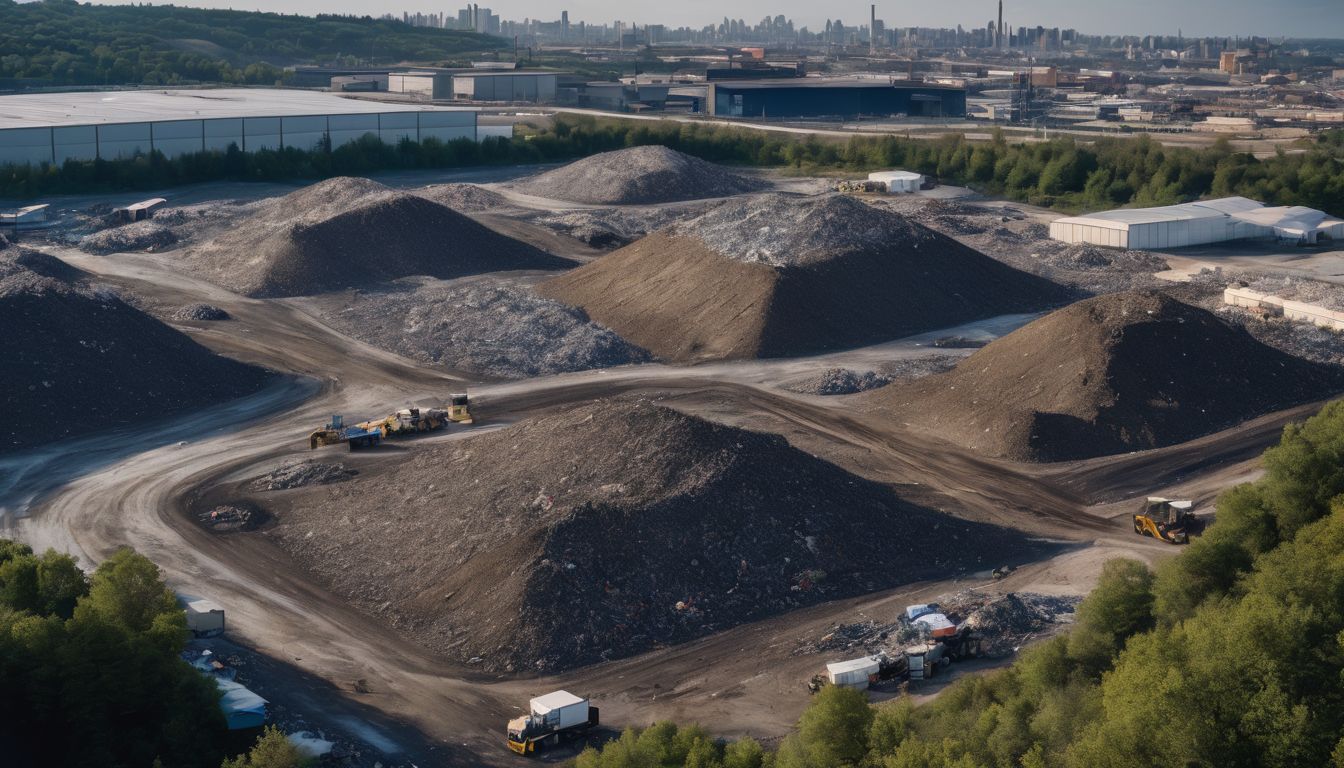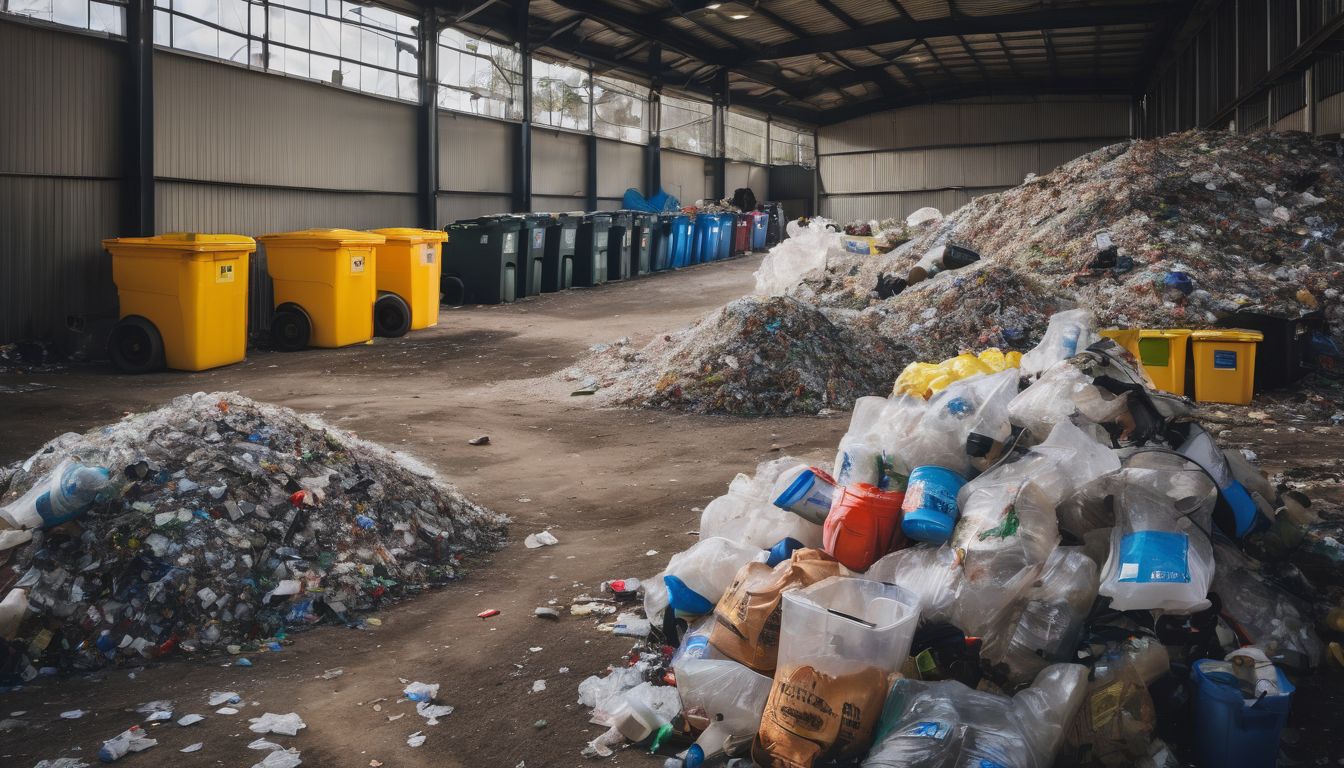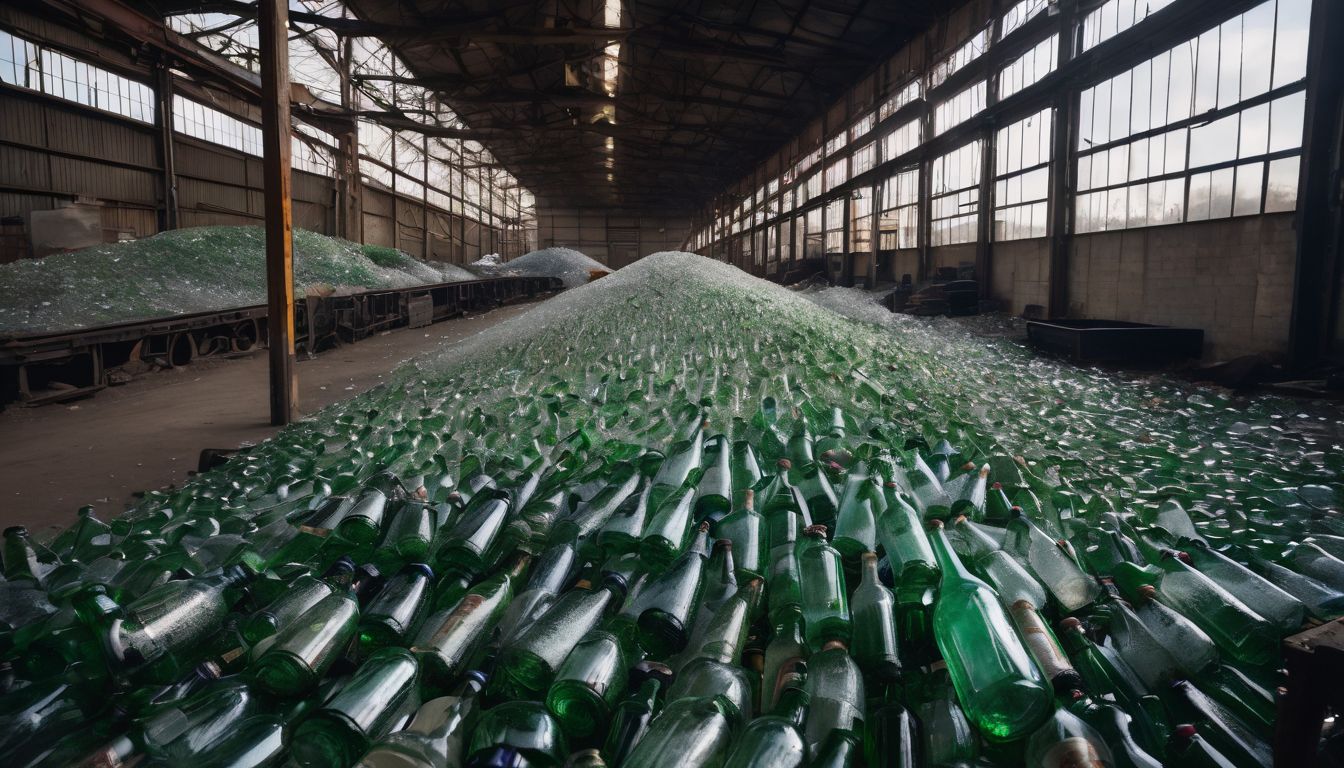The hospitality industry faces a huge task: cutting down waste. Every year, hotels generate mounds of leftover food, packaging, and paper. Our article guides you through practical steps to tackle this issue head-on, making your business greener and more cost-effective.
Keep reading to transform trash into treasure!
Key Takeaways
- Hotels in the hospitality industry can cut operating costs and improve their image by adopting waste management practices like recycling, composting food scraps, and selling recyclable goods.
- Introducing energy-efficient equipment, such as LED lighting and Energy Star-rated appliances, significantly reduces a hotel’s energy consumption and contributes to its waste reduction efforts.
- Engaging with local communities for collaborative recycling initiatives, sourcing eco-friendly products from local suppliers, and implementing circular economy solutions are effective strategies for sustainable waste management in hotels.
- Certifications like LEED or Green Key provide recognition to hotels committed to environmental standards through regular assessments of their waste management strategies.
- Sustainable design elements such as renewable energy sources, recycled materials in construction, and green roofs help lower the carbon footprint of hotels while setting new industry standards for ecological responsibility.
The Importance of Waste Management in the Hospitality Industry
Effective waste management in the hospitality industry is crucial for economic, environmental, and social reasons. It helps to reduce costs, minimise the industry’s carbon footprint, and promote responsible business practices.
Economic benefits
Hotels that invest in waste management practices often see a significant cut in their operating costs. By recycling materials and composting food scraps, they reduce the frequency of waste disposal services needed, leading to savings on hefty fees.
Reusing valuable materials not only trims down expenses but also creates an additional revenue stream by selling recyclable goods.
Implementing sustainable practices can boost a hotel’s reputation and attract environmentally conscious guests. Guests today prefer establishments that demonstrate environmental stewardship, directly influencing occupancy rates and profitability.
A robust recycling programme or commitment to zero-waste initiatives strengthens a brand’s image and drives economic gains through consumer loyalty and positive publicity.
Environmental responsibility
Hotels must take environmental responsibility seriously to minimise their impact on the planet. Implementing recycling programmes, conserving resources, and reducing waste are crucial steps in this direction.
By reusing materials and investing in eco-friendly solutions, hotels can significantly lower their carbon footprint. Effective disposal methods and waste reduction initiatives further contribute to sustainable hospitality practices, paving the way for a greener future.
Engaging in green initiatives like circular economy strategies allows hotels to divert waste from landfills while promoting resource conservation. Collaborating with local communities and suppliers also fosters sustainability within the industry.
Social responsibility
Transitioning from environmental responsibility to social responsibility, the hospitality industry has a crucial role in promoting sustainable waste management practices. Embracing eco-friendly solutions and effectively managing waste not only reduces their carbon footprint but also sets an example for others, inspiring positive change.
By prioritising responsible waste disposal methods, hotels contribute to the well-being of local communities and stakeholders through their commitment to reducing environmental impact and promoting a healthier planet.
This calls for collaborative efforts from all involved in the industry to maintain a balance between economic growth and ecological preservation.
Top 5 Waste Management Challenges Faced by the Hospitality Industry
The hospitality industry faces numerous waste management challenges such as the high volume of single-use packaging, energy consumption, managing zero waste initiatives, food waste management, and handling paper waste.
These challenges require innovative solutions to promote effective waste management in hotels and restaurants.
High volume of single-use packaging
Hospitality businesses often face challenges due to the high volume of single-use packaging they generate. This issue contributes significantly to the industry’s overall waste production and environmental impact, making it crucial for hotels and restaurants to find sustainable alternatives.
Implementing eco-friendly packaging solutions can greatly reduce the amount of waste sent to landfills, aligning with conservation efforts in waste management.
By reducing reliance on single-use packaging, hospitality establishments can decrease their environmental footprint while supporting conservation initiatives. This presents an opportunity for environmentally conscious individuals within these organisations to drive positive change by advocating for and implementing eco-friendly solutions that align with effective waste management practices.
Energy consumption
Hotels consume substantial energy, from heating and cooling to lighting and running kitchen equipment. Implementing energy-efficient solutions significantly reduces consumption and overheads.
Replacing traditional bulbs with LED lights, installing motion sensors, and using Energy Star-rated appliances are effective measures hotels can adopt to lower energy usage, contributing positively towards their waste management initiatives.
Moving on to the next challenge faced by the hospitality industry – managing zero waste initiatives.
Managing zero waste initiatives
Hotels can effectively manage zero waste initiatives by implementing comprehensive recycling programmes. Investing in composting facilities for food waste and promoting the use of reusable products can significantly reduce overall waste generation.
Incentivising guests to participate in waste reduction efforts can also play a crucial role in achieving zero waste goals.
Embracing innovative packaging solutions, such as biodegradable and compostable materials, contributes to reducing single-use plastic usage. Engaging with local suppliers that align with sustainable practices further supports hotels’ efforts in managing zero waste initiatives.
Food waste management
Hotels can effectively manage food waste by implementing efficient kitchen practices and engaging in composting. Reducing portion sizes, creating daily specials to use surplus ingredients, and donating excess food to local charities are practical solutions to limit food wastage.
Implementing a robust inventory management system, training staff on proper handling of perishable items, and using leftover foods for staff meals also contribute to effective food waste reduction.
Additionally, utilising smart technologies such as digital menu boards displaying real-time availability of dishes can help manage inventory levels and reduce over-purchasing. Engaging with suppliers who support sustainable farming methods and purchasing locally sourced produce further minimises the environmental impact associated with excessive food waste.
Handling paper waste
Transitioning from the management of food waste to handling paper waste, hotels can significantly reduce their environmental impact by implementing effective paper waste disposal methods.
Implementing a comprehensive recycling program for paper products, such as newspapers, cardboard packaging, and office paper, is crucial in diverting waste from landfills and reducing the demand for new paper production.
Utilising eco-friendly paper products and encouraging guests to opt for digital communication rather than printed materials can also contribute to reducing overall paper waste within hotel operations.
To further minimise the impact of paper waste on the environment, hotels should consider adopting innovative solutions such as sourcing biodegradable or compostable packaging materials and utilising recycled content in their stationary supplies.
Best Practices for Effective Waste Management in Hotels
Implementing eco-friendly packaging, investing in energy-efficient equipment, encouraging zero waste initiatives, implementing food waste management strategies, and reducing paper waste are all essential best practices for effective waste management in hotels.
These practices not only reduce environmental impact but also contribute to cost savings and enhance the overall sustainability of the hospitality industry.
Implementing eco-friendly packaging
Hotels can adopt eco-friendly packaging to reduce their environmental impact and support conservation efforts. Eco-friendly packaging uses materials that are biodegradable, compostable, or recyclable, contributing to waste diversion and reducing the amount of non-biodegradable waste in landfills.
Choosing sustainable packaging options such as compostable food containers, paper straws, and reusable amenities not only reflects a commitment to environmental responsibility but also resonates with environmentally conscious guests who value sustainable practices within the hospitality industry.
To further enhance waste management efforts in the hospitality sector and promote conservation initiatives, hotels can proactively seek suppliers that offer eco-friendly packaging solutions.
Investing in energy-efficient equipment
Invest in energy-efficient equipment to reduce the environmental impact of hotel operations. Upgrading to LED lighting, low-flow taps, and energy-efficient appliances significantly lowers energy consumption and operating costs.
Implementing these changes aligns with sustainability goals promoting a greener future for the hospitality industry.
Now, let’s explore effective tactics for encouraging zero waste initiatives in hotels.
Encouraging zero waste initiatives
To further enhance waste management in the hospitality industry, encouraging zero waste initiatives is vital. By setting clear goals and implementing comprehensive strategies, hotels can significantly reduce their environmental impact and contribute to a more sustainable future.
Engaging with staff and guests to promote recycling, reducing single-use items, and finding innovative ways to reuse materials are all crucial steps towards achieving zero waste objectives.
Implementing robust systems for sorting and managing waste, along with providing education on sustainable practices, can effectively encourage everyone involved in the hotel’s operation to play a role in minimising waste production.
Implementing food waste management strategies
Hotels can implement food waste management strategies by setting up composting systems and donating surplus food to local charities. Staff training on portion control and inventory management can also reduce kitchen wastage.
Installing energy-efficient equipment and monitoring production processes can minimise over-preparation, leading to significant reductions in food waste.
Utilising smart technologies such as waste tracking software helps hotels identify patterns of food wastage, allowing for targeted improvements. Collaborating with local farms for organic recycling or implementing anaerobic digestion systems are effective ways to turn food scraps into renewable energy sources.
Reducing paper waste
Hotels can reduce paper waste by transitioning to digital platforms for guest communication and documentation. Implementing electronic check-in and check-out processes along with e-billing not only reduces paper usage but also enhances convenience for guests.
Additionally, hotels can encourage staff to use electronic devices for note-taking and task management rather than relying on printed materials, decreasing the need for paper supplies.
Incorporating hybrid printers that allow double-sided printing or setting default print settings to black and white can significantly diminish paper consumption. Utilising recycled paper products for essential documents like menus, brochures, and reports is another effective way to minimise environmental impact.
Embracing a “paperless office” culture through staff training further reinforces the commitment towards sustainability.
Providing staff training on sustainability practices
Staff training on sustainability practices is vital for fostering a culture of environmental responsibility in the hospitality industry. Training sessions equip employees with the knowledge and skills to implement eco-friendly solutions, such as waste reduction strategies and responsible disposal methods.
By incorporating sustainability into staff training, hotels can effectively contribute to waste management efforts while meeting the growing demand for environmentally conscious services.
Training on sustainability practices empowers hotel staff to actively participate in waste reduction initiatives, ultimately leading to a more sustainable future for the hospitality industry.
Innovative Solutions for Waste Management in the Hospitality Industry
Hotels can utilise smart technologies for food waste reduction, implement circular economy solutions, collaborate with local communities and suppliers, engage in green certification programmes, and incorporate sustainable design and architecture.
Interested in learning more about how the hospitality industry can effectively manage waste? Keep reading to find out!
Utilising smart technologies for food waste reduction
Hotels can utilise smart technologies to reduce food waste. This involves using advanced monitoring systems and sensors to track food consumption patterns, thus enabling precise inventory management.
By implementing these technologies, hotels can optimise food ordering and production, reducing excess waste.
Smart technologies also facilitate the identification of perishable items that are close to expiration, prompting proactive measures to repurpose or donate surplus food. Additionally, these solutions aid in streamlining kitchen operations by automating processes and ensuring accurate portion control.
Implementing circular economy solutions
Hotels can implement circular economy solutions by embracing a “reduce, reuse, recycle” approach to their operations. This includes using renewable or recyclable materials in their products and services, as well as implementing waste reduction initiatives such as composting organic waste and repurposing materials.
By collaborating with local communities and suppliers, hotels can create closed-loop systems that minimise waste generation. Additionally, investing in green certification programmes and sustainable design practices can further promote the principles of circular economy within the hospitality industry.
Embracing circular economy solutions not only benefits the environment but also aligns with the economic goals of businesses in the hospitality industry. Incorporating these strategies supports conservation efforts while appealing to environmentally conscious guests seeking eco-friendly accommodation options.
Collaborating with local communities and suppliers
To further enhance waste management efforts, the hospitality industry can collaborate with local communities and suppliers to implement sustainable practices. By partnering with nearby residents and businesses, hotels can exchange ideas on reducing waste and explore opportunities for recycling initiatives.
Engaging with local suppliers enables hotels to source eco-friendly products that align with their sustainability goals, thereby promoting a more circular economy within the community.
Moreover, collaborating also creates an opportunity for educational outreach programs, where hotels can work alongside local stakeholders to raise awareness about effective waste disposal methods and encourage environmentally friendly practices in the community.
Engaging in green certification programmes
Hotels can enhance their sustainability efforts by participating in green certification programmes. These initiatives validate a hotel’s commitment to eco-friendly practices, providing guests with assurance that the establishment is adhering to environmental standards.
By obtaining certifications, such as LEED (Leadership in Energy and Environmental Design) or Green Key, hotels can showcase their dedication to waste reduction, energy efficiency, and eco-friendly solutions.
The process involves rigorous assessments and audits, encouraging continuous improvement in waste management strategies within the hospitality industry.
By engaging in green certification programmes, hotels demonstrate leadership in sustainable business practices and contribute positively to environmental conservation while meeting the expectations of environmentally conscious guests.
Incorporating sustainable design and architecture
Hotels can significantly reduce their environmental impact by incorporating sustainable design and architecture. This includes utilising renewable energy sources, such as solar panels or wind turbines, and integrating energy-efficient technologies into the building’s structure.
By using eco-friendly materials like bamboo, recycled timber, or low VOC paint in construction and interior design, hotels can promote sustainability throughout their facilities. Implementing green roofs with vegetation also contributes to natural insulation and reduces stormwater runoff.
Such environmentally friendly design practices not only benefit the environment but also enhance the overall guest experience while aligning with the values of conservation-minded individuals.
The integration of sustainable design and architecture in hospitality establishments demonstrates a commitment to reducing waste and fostering an ecologically responsible business model that sets new standards within the industry.
Conclusion
Effective waste management is crucial for the sustainability of the hospitality industry, and each stakeholder has a role to play in promoting sustainable practices. To learn about innovative solutions and best practices for waste management, read more on our blog.
Importance of waste management in maintaining a sustainable hospitality industry
Effective waste management is crucial for maintaining a sustainable hospitality industry. It provides economic benefits, promotes environmental responsibility, and fulfils social obligations.
Implementing eco-friendly solutions like reducing paper waste and investing in energy-efficient equipment not only reduces costs but also minimises the environmental impact.
Sustainable waste management practices are vital in ensuring the long-term viability of the hospitality industry. By embracing responsible waste management strategies, hotels can attract environmentally conscious individuals while supporting conservation efforts to create a positive impact on the environment.
Role of each stakeholder in promoting effective waste management
Every stakeholder in the hospitality industry plays a crucial role in promoting effective waste management. Hotel owners can invest in eco-friendly practices, such as implementing recycling programs and reducing single-use plastic usage.
Staff members can actively participate by segregating waste properly and using resources efficiently. Suppliers also have a part to play by providing sustainable products and packaging options for hotels.
Local communities can support waste reduction initiatives through proper disposal of their own waste and participating in hotel-led sustainability events.
Moreover, guests are key stakeholders who can contribute by reusing towels, opting for digital communication over paper, and supporting hotels that prioritise environmental responsibility.
FAQs
1. Why is recycling important in the hospitality industry?
Recycling is vital in the hospitality industry to manage hotel waste effectively, keep waste statistics low, and promote eco-friendly solutions for a healthier environment.
2. What types of waste should hotels focus on managing?
Hotels should concentrate on managing all forms of hotel waste, including food scraps, packaging materials, and operational disposables, with a strong emphasis on recycling and reduction strategies.
3. Can implementing eco-friendly solutions improve waste management in hotels?
Yes, adopting eco-friendly solutions can significantly enhance waste management practices within the hospitality industry by reducing landfill contributions and conserving resources.
4. How often should hotels review their waste statistics to ensure effective management?
Hotels are encouraged to regularly review their waste statistics as part of their ongoing commitment to continuous improvement in recycling efforts and overall sustainability within the industry.





